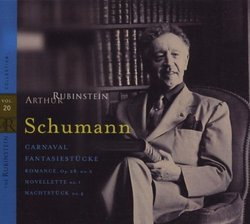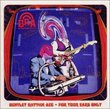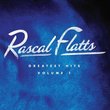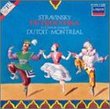| All Artists: Robert Schumann, Artur Rubinstein Title: Rubinstein Collection, Vol. 20 Members Wishing: 1 Total Copies: 0 Label: RCA Original Release Date: 1/1/1949 Re-Release Date: 8/7/2001 Album Type: Box set, Original recording remastered Genre: Classical Styles: Chamber Music, Historical Periods, Classical (c.1770-1830), Modern, 20th, & 21st Century Number of Discs: 1 SwapaCD Credits: 1 UPC: 090266302024 |
Search - Robert Schumann, Artur Rubinstein :: Rubinstein Collection, Vol. 20
 | Robert Schumann, Artur Rubinstein Rubinstein Collection, Vol. 20 Genre: Classical
|
Larger Image |
CD DetailsSimilar CDs
|
CD ReviewsBold & Poetic Mono Schumann from Rubinstein Hank Drake | Cleveland, OH United States | 09/03/2001 (4 out of 5 stars) "Arthur Rubinstein at home with Schumann's more extroverted, less neurotic works. This is understandable, especially when one considers that Rubinstein's mentor, Joseph Joachim, was a close associate of Johannes Brahms, who was in turn a close friend of both Robert and Clara Schumann. Carnaval, Op. 9 was particularly close to Rubinstein's heart. It was a mainstay of his concert programs throughout his career, including at his very last concert in 1976. As in his 1962 stereo remake, Rubinstein in 1949 avoids the temptation to overly sectionalize the work--this is a remarkably direct performance. True, there is plenty of contrast between the extroverted Florestan and meditative Eusebius aspects of Schumann's musical nature, but Rubinstein never exaggerates these for pianistic effect. Incidentally, Rubinstein does not play the Sphinxes section midway through the piece. Schumann left it to the interpreter's discretion as to whether to play this part, which is notated unconventionally. Some have chosen to play it (Rachmaninoff {whose recording was considered by Rubinstein the greatest ever made, and which is mandatory for any serious piano collector}, Horowitz, and Uchida, among others); some have opted out (Rubinstein, Cherkassky, and Clara Schumann, to name a few). The Fantasiestucke, Op. 12 featured on some of Rubinstein's earliest programs, including from his first American tour in 1906. He recorded it three times: this version, from 1949; a stereo remake in 1962; and in 1976 as part of his final solo recording. (There is an additional, very sloppy live version from 1975 which Rubinstein did not authorize for release--it should be avoided at all costs.) This 1949 version succeeds mainly for the same reasons which make the companion Carnaval work so well: the artful balance of detail with totality. This is balanced, as opposed to schizophrenic, Schumann playing. The Novellette is given a rather brusque, offhanded performance. The Nachtstuck features rather aimless, generic phrasing--it almost sounds as if it were being sightread. However, the Romance is performed with gentle ardor and poetry, the main theme--played by the thumbs of both hands--beautifully balanced with the accompinament. The items on this CD were recorded in 1949 and 1953. The mono sound is somewhat dry and airless, but acceptable." Distinction and touch of class! Hiram Gomez Pardo | Valencia, Venezuela | 05/28/2008 (4 out of 5 stars) "The egregious pianism of Arthur Rubinstein became him a musical legend, reviving that reminiscence of the Romantic pianist, who engaged the great audiences thanks to his undeniable charisma and mundane effluvium.
For many, he was the voice of Chopin, and that factor has tended to overlap another distinguished composer like Schumann was. The basic difference between his approach and Kempff 's one is perhaps the Mediterranean lyricism and nocturnal visions he conferred it, making Schumann sounds like an extension of Chopin, the intimate character of these works allowed him to draw with freshness and sumptuous musicality these well known piano pieces. Surrounded into a very introspective atmosphere, without the intellectual approach that many other pianists use to give us, that human warm and visible lyricism literally hovers the sonorous spectre with pristine elegance and dazzling mood. To my mind the jewel of the crown of this album are the Fantasiestucke OP. 12, recorded on December 12, 1953 (when the master was in his 67) . The Carnaval in hands of Michelangeli, Moravec and Kempff constitute better options. But integrally, this album is a worthy to collect album for those who want to get the essential facets of Robert Schumann. " |

 Track Listings (32) - Disc #1
Track Listings (32) - Disc #1


